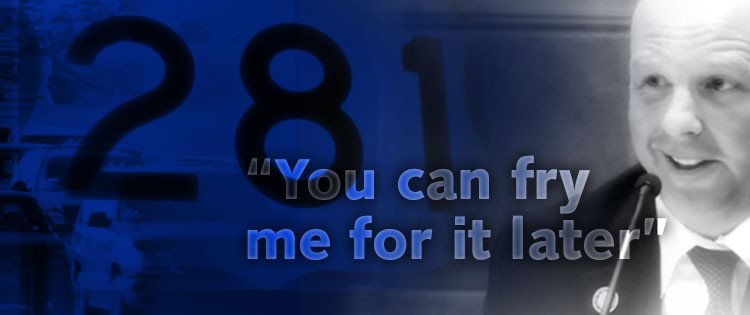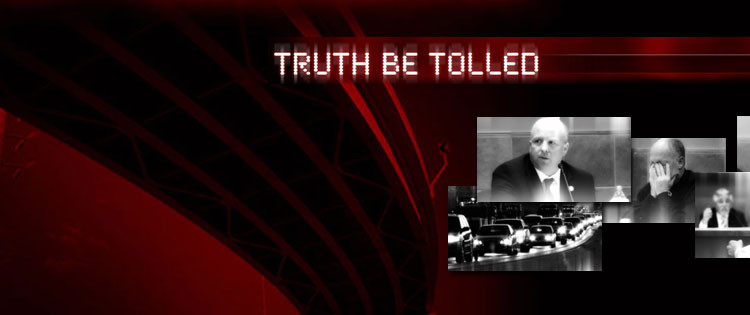ELECTION 2016
Smith record causing opponent to raise Cain
By Terri Hall
Examiner.com
October 29, 2015
It’s shaping up to be a tough re-election season for incumbents. One of them may be Baytown’s ethically challenged Wayne Smith. His voting record on transportation reflects a disconnect with many Texans in District 128 who oppose toll roads, especially the privatization of public roads. It’s a record that got challenger Briscoe Cain to take notice, and he’s running to replace Smith as a more conservative voice in the Texas House.
Elected to seven terms in the Texas House, Smith chairs the Committee on Licensing and Administrative Procedures. As a former member of the Transportation Committee and as Chair of the Licensing Committee, Smith has potential conflicts of interest as a licensed Professional Engineer who owned Wayne Smith and Associates Consulting Engineers up until his election to the House. He also served as Legislative & Government Affairs Chairman for the Texas Society of Professional Engineers as well as serving as its President prior to taking office. Smith’s committee has oversight over the Texas Society of Professional Engineers.
Despite Texas law prohibiting politicians from using campaign funds for personal use, Smith violated Section 253.035 of the Election Code on 32 separate occasions between July 2002 and June of 2007 to pay dues to the National Society of Professional Engineers, among other professional associations.
His wife, Brenda, picked up where he left off, serving as an attorney for Lockwood, Andrews & Newnam, who, you guessed it, builds roads, including toll roads. So Smith is in the unique position of personally profiting from his connections to lawmakers and his influence over transportation and licensing policy.
Though Smith authored a bill, HB 1892, in 2007 to place a moratorium on private, corporate toll roads known as Comprehensive Development Agreements (CDAs) or public private partnerships, former Governor Rick Perry vetoed the bill and advanced a severely compromised bill, SB 792, in its place. Smith immediately caved to the governor, became his henchman on the bill, and even lied to his colleagues about the nature of market value tolling, claiming it only applied to the Grand Parkway project not every toll project across the state. Of course, once the bill passed, it was made very clear by legal experts and attorneys representing toll agencies that market value tolling did, in fact, apply to all toll projects in Texas.
So what is market valuation? It essentially allows a public toll entity to view the toll project as an ATM machine, similar to a private toll contract, and determine an upfront payment to be used on other projects based on its determined worth. This is just like Cintra offering Dallas officials $2.8 billion up front for Hwy 121 in exchange for the right to collect tolls for 50 years. It results in charging the highest possible tolls to use public highways since the toll is no longer based on the costs of constructing the road and paying off its debt. It would instead be based on how much officials think they could milk commuters for during congested hours. Market valuation is runaway taxation in the hands of un-elected toll boards.
William Lutz with Lone Star Report wrote in May 2007 of the ramifications of SB 792:
“A further flaw is it allows continuation of current policy, whereby the Texas Department of Transportation (TxDOT) may require up-front ‘concession fees’ in exchange for building some new toll projects. The tolls that pay these concession fees are taxes, not user fees, because concession fees result in tolls over and above the amount required to build and maintain the road. Since the fees are paid back over time from toll revenue, it increases the burden of debt on our children and grandchildren. In short, concession fees, which are continued by the ‘market valuation’ language in SB 792, allow the government to raise taxes and do off-budget spending in a manner concealed to the public and without proper legislative oversight and authorization.”
The San Antonio Express-News on June 3, 2007, describes the Robin Hood scheme, “The provision would require market valuations to gauge how much money a toll road could bring in, including what motorists are willing to pay, and earmarking the profits to other area projects. ‘I’m uncomfortable with it,’ Bill Thornton (Chairman of the Alamo Regional Mobility Authority) said of the mandate. ‘Government is not here to make a profit, government is here to provide a service.’”
Governor’s puppet
The word given to House members in the back rooms prior to the vote on the House floor was ‘follow Wayne Smith.’ The leadership said if he votes for something, follow. If he votes against, follow. That’s what the governor wants.
A report in the Austin American Statesman, May 17, 2007, echoed the same sentiment when Smith said, “We could end up with another bill on the governor’s desk that he’ll veto” if members push too far with changes.
That statement summarizes Smith’s approach to governing. Go along to get along. If you push too hard, you might make waves or get leadership mad at you. Never mind if leadership is asking you to go against your own constituents’ best interests or your own values and principles.
Smith also authored bills to give money to rail boondoggles (HB 2434, 81st session) and to grant eminent domain powers to what amounts to private developers who control Municipal Utility Districts (HB 4201, 84th session). He voted to allow toll entities to ‘own’ their toll projects in perpetuity (HB 1112, 82nd session), virtually clinching their ability to continue to charge tolls indefinitely, which make tolls a permanent new tax.
In addition, he’s a big fan of Transportation Reinvestment Zones (TRZ), patterned after Tax Increment Reinvestment Zones (TIRZ), and voted to allow TRZ property taxes to be used to subsidize toll roads, a double tax. Smith’s wife served on a TIRZ board in Harris County, posing another potential conflict for a sitting legislator. How can he see clearly on legislation pertaining to TIRZ when his wife was part of one? Many grassroots groups and even the Houston Chronicle and Houston Press view TIRZs as placing taxing authority in the hands of un-elected boards, opening the door to corruption and mismanagement.
With friends like this, who needs enemies. Smith has become a career politician, serving for 12 years. It’s clear he represents special interests instead of his constituents’. Taxpayers deserve better and now they have a choice in the race for Texas House District 128. For more information on Cain, go to: http://briscoecain.com/.


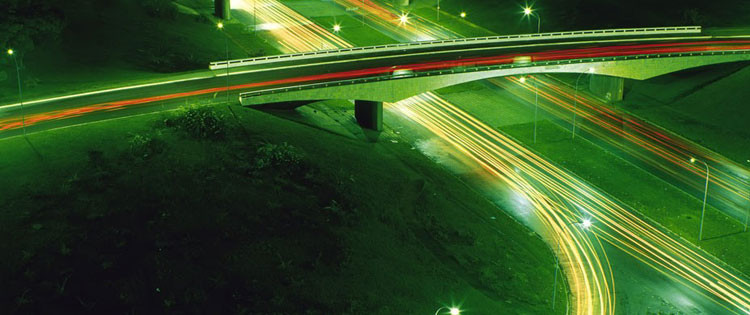
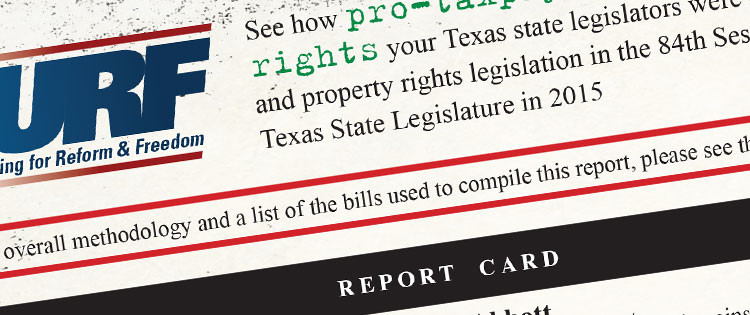
 Grassroots ask lawmakers for ‘Toll-free Texas,’ unveil reform package
Grassroots ask lawmakers for ‘Toll-free Texas,’ unveil reform package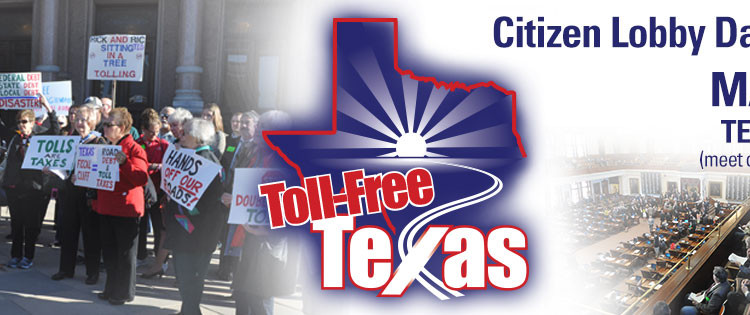
 Concerned citizens from across the state will gather in Austin to interact with lawmakers on transportation-related issues. We’ve seen a massive increase in our cost to drive through tolls, handing control of our public roads to private foreign corporations, and unsustainable debt sweep the state, with more to come unless we make our voices heard.
Concerned citizens from across the state will gather in Austin to interact with lawmakers on transportation-related issues. We’ve seen a massive increase in our cost to drive through tolls, handing control of our public roads to private foreign corporations, and unsustainable debt sweep the state, with more to come unless we make our voices heard. Bring money for lunch. We plan to eat together in the Members Lounge where we’ll hear from some special guests. For a box lunch from Jason’s Deli, the cost is $10. You
Bring money for lunch. We plan to eat together in the Members Lounge where we’ll hear from some special guests. For a box lunch from Jason’s Deli, the cost is $10. You 
